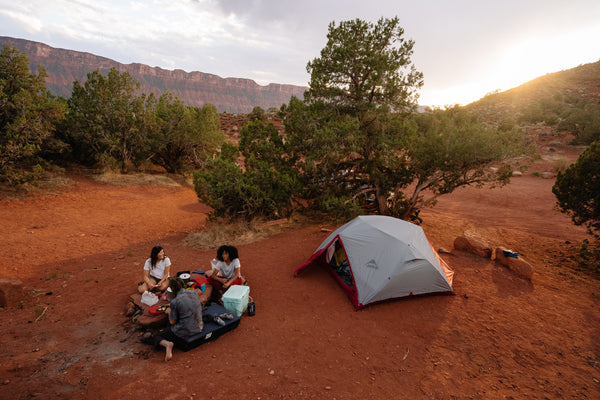
The Ten Essentials
The ten essentials are a series of first aid and emergency items that are recommended for any outdoor excursion. While you may never use any of them, it’s important to be ready in case of an emergency or other unforeseen event.

Navigation: Knowing where you are and where you’re going is important for any trip. Having a map, compass, GPS or personal beacon is an essential item to have on you and which one you bring will be based on the difficulty of your adventure. A map or compass will be perfect for a day trip while a GPS or personal beacon is great to have for multi-day or more intense trips.
- Map: bring a map and know how to read it! Having navigation that doesn’t rely on batteries is a smart move and is perfect for long or short hikes.
- Compass: just like a physical map, a compass is a great navigation tool to have that doesn’t rely on technology in order to work. Some compasses also come with a mirror which is useful in the case you get lost and need to signal to a helicopter or a rescue team.
- GPS: A great alternative to using your phone. GPS systems are designed with the outdoor enthusiast in mind and are built to be durable and waterproof. Systems like the Garmin inReach allow you to send messages, opt in for weather reports and provide thousands of maps that may not be accessible via your smartphone.
- Personal Beacon: A personal beacon is a great device to have in an emergency. Once activated, a beacon will send out a SOS with your location and can work in remote locations where you may not have service.
Light Source: Even if you’re not planning on hiking in the dark, anything can happen. Bring a light source like a headlamp or lantern in case you get stuck out longer than you planned and need to navigate the darkness. Bring extra batteries too.
Sun Protection: Sunscreen, hats and sunglasses are important to keep the elements off you as much as possible. Minimizing your exposure to the sun will make for a much more pleasant trip and will spare you the suffering of a high elevation burn and dehydration later. Bringing a layer with built in UPF like the Outdoor Research Astroman Sun Hoodie is a good call too.
First Aid Kit: Start with a basic med kit and add your own essentials and medicines to create an ideal first aid kit to suit your own needs. Make sure to check expiration dates before taking it with you and consider adding an emergency guide in case you encounter a new medical emergency.
Knife/Multi-tool: Bring a knife or multi-tool in order to make repairs when you’re out in the backcountry. A knife, scissors and duct tape are key items to carry in case you rip your tent, down jacket or other important items.
Fire Starter: Even if you have no intention of starting a fire, building one is important in the case of an emergency or if your Jet Boil breaks unexpectedly.
Shelter: Bring an emergency blanket or bivy in case you get stuck in surprise weather or get injured and can’t move to shelter for the night. A blanket is a lightweight, compact and affordable solution.
Extra Food: Don’t worry about cutting the weight of your pack when it comes to extra food. Opt for dense and nutritious food like a Range Bar in case you need extra fuel in a pinch.
Extra Water: Bring more water than you think you need! Extra hydration, purification tablets or a filter are crucial and can keep you safe from the consequences of dehydration.
Extra Clothes: Weather conditions can change quickly and without warning. Bring a jacket, an extra pair of socks and other layers in case intense weather or an emergency occurs.

